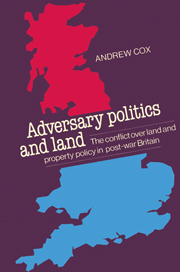Book contents
- Frontmatter
- Contents
- Preface
- PART A INTRODUCTION
- PART B THE PROBLEM OF LAND AND PROPERTY IN BRITAIN AND THE EFFECTIVE LIMITS ON GOVERNMENT POLICY INITIATION
- PART C THE HISTORY OF ADVERSARIAL POLICY FAILURE IN LAND AND PROPERTY IN POST-WAR BRITAIN
- PART D CONCLUSION
- 9 The failure of adversarial policies and the enigma of the Thatcher government
- Notes
- Index
9 - The failure of adversarial policies and the enigma of the Thatcher government
Published online by Cambridge University Press: 29 September 2009
- Frontmatter
- Contents
- Preface
- PART A INTRODUCTION
- PART B THE PROBLEM OF LAND AND PROPERTY IN BRITAIN AND THE EFFECTIVE LIMITS ON GOVERNMENT POLICY INITIATION
- PART C THE HISTORY OF ADVERSARIAL POLICY FAILURE IN LAND AND PROPERTY IN POST-WAR BRITAIN
- PART D CONCLUSION
- 9 The failure of adversarial policies and the enigma of the Thatcher government
- Notes
- Index
Summary
Adversary politics and the Thatcher approach to land and property. A policy framework for land and property.
Adversary politics and the Thatcher approach to land and property
The Conservative government which returned to office in May 1979 refused to recognise the developing consensus of ‘fiscal-interventionism’ which a substantial number of market participants – both public and private – had come to accept by 1979. Despite this and its espousal of free market rhetoric, its initial record in office was somewhat enigmatic. One might have expected, given the rhetoric, a return to the laissez-faire approach pursued under Heath. Ironically, even in opposition, senior Party spokesmen – Hugh Rossi, Michael Latham and Timothy Raison — were unwilling to make this a commitment. True, they were committed to repealing the Community Land Act but they promised to retain the Development Land Tax at a lower level. In other words, the manifesto committed a new Conservative government to a ‘fiscalregulatory’ approach which was within the basic framework for viable policy continuity and workability set out in Chapter 3.
The Thatcher government also went somewhat further than might have been expected to protect the state's role. On entering office Michael Heseltine (Secretary of State for the Environment) stopped any further expenditure on the CLS and repealed the Community Land Act in the 1980, Local Government, Planning and Land Act. In its first budget the government also reduced the level of the Development Land Tax to 60 per cent and raised the allowance against tax to £50,000 instead of £10,000.
- Type
- Chapter
- Information
- Adversary Politics and LandThe Conflict Over Land and Property Policy in Post-War Britain, pp. 195 - 203Publisher: Cambridge University PressPrint publication year: 1984



